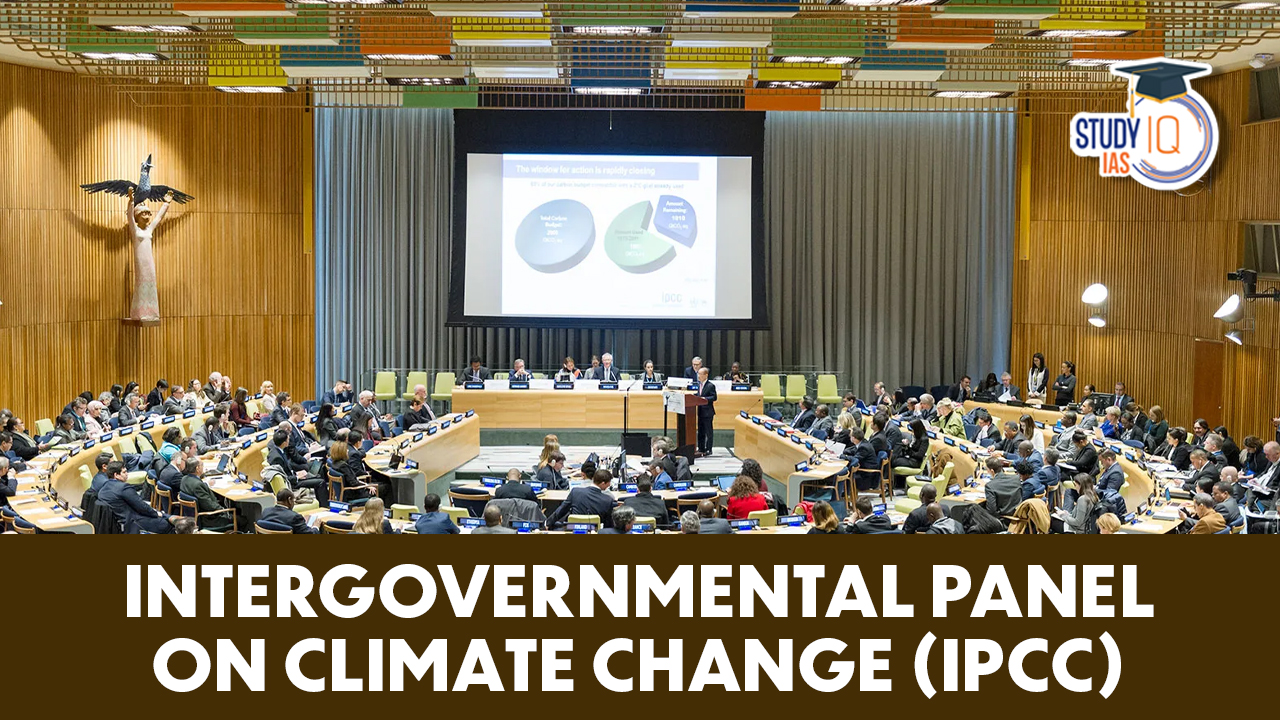Table of Contents
Intergovernmental Panel on Climate Change
The Intergovernmental Panel on Climate Change is a scientific government agency of the United Nations that was set up at the request of member governments to give the world an unbiased, scientific assessment of climate change and its effects on countries’ political and economic systems. It was established in 1988 by the World Meteorological Organization (WMO) and the United Nations Environment Programme (UNEP), and the UN General Assembly later endorsed it. There are 195 nations that are members of it, and its headquarters are in Geneva, Switzerland. You will learn about the Intergovernmental Panel On Climate Change (IPCC) in this article, which will help you prepare for Environment which makes an essential part of UPSC Syllabus.
Intergovernmental Panel on Climate Change Overview
The IPCC informs governments about the state of knowledge of climate change. It accomplishes this by reviewing all of the pertinent scientific literature. This covers the effects and dangers of nature, the economy, and society. It also includes potential lines of defense. The IPCC does not carry out novel research on its own. It attempts to be thorough and unbiased. To examine the articles, thousands of scientists and other professionals contribute their time. The overview on Intergovernmental Panel on Climate Change has been provided below in the table:
| Intergovernmental Panel on Climate Change Overview | |
| Particulars | Details |
| Abbreviation of Intergovernmental Panel on Climate Change | IPCC |
| IPCC is | Intergovernmental Body of United Nation |
| Formation of IPCC | 1988 |
| Established by | WMO and UNEP (Parent Organisation of IPCC) |
| IPCC Predecessor was | Advisory Group on Greenhouse Gases (AGGG) |
| IPCC Headquarter | Geneva, Switzerland |
| Members Nations | 195 Countries |
| Received Nobel Prize in | 2007 along with AI Gore |
| Globally Recognised as | Authority on Climate Change, and it strongly influenced the historic Paris Agreement. |
| Official Website | https://www.ipcc.ch/ |
Intergovernmental Panel On Climate Change Functions
The main function of the IPCC is to write reports that assess our understanding of climate change. Examples of these are methodological reports, assessment reports, and special reports. Meetings of the IPCC’s government representatives are held as plenary sessions of the Panel or IPCC Working Groups and are used to approve, adopt, and accept reports.
- The IPCC work program and other issues, including its budget and report outlines, were also decided upon during the IPCC Plenary Sessions.
- The IPCC Bureau consults with the Panel on scientific and technical aspects of its work on a regular basis.
- The IPCC organizes author meetings and expert scoping sessions to create reports.
- The IPCC offers speakers at various conferences in addition to taking part in outreach programs it sponsors or hosts to disseminate its findings and explain its work.
- Aviation, regional climate change impacts, technology transfer, emission scenarios, land use, land use change, forestry, carbon dioxide capture and storage, and the connection between ozone protection and the global climate system are just a few of the topics that have been the subject of special reports.
- The main objective of the IPCC’s Task Force on National Greenhouse Gas Inventories is to create and enhance a framework for figuring out and disclosing national greenhouse gas emissions and removals.
IPCC Assessment Report
The most thorough evaluations of the state of the Earth’s climate are found in the Assessment Reports, the first of which was released in 1990. Every few years, or roughly every seven years, the IPCC releases assessment reports. To create a common understanding of climate change, hundreds of experts meticulously review all pertinent, published scientific literature.
- In 1995, 2001, 2007, and 2015, the four subsequent assessment reports, which totaled thousands of pages, were released.
- The cornerstone for the global response to climate change has been these.
- Over the years, each evaluation report has built on the work of the previous ones by supplying more justification, data, and statistics.
- As a result, most decisions made today about climate change and its effects are made with a great deal more confidence, clarity, and access to new data than they were in the past.
- The Paris Agreement and the Kyoto Protocol came out of these deliberations.
- In response to the Fifth Assessment Report, the Paris Agreement was negotiated.
- Three scientific working groups prepare the assessment reports. The primary focus of Working Group I is the scientific underpinnings of climate change. Working Group II looks into potential repercussions, weaknesses, and adaptive difficulties. Working Group III focuses on potential countermeasures to climate change.
IPCC Sixth Assessment Report 2021
The Sixth Assessment Report (AR6) of the Intergovernmental Panel on Climate Change (IPCC) of the United Nations (UN) examines the scientific, technological, and socioeconomic evidence for climate change. This study’s physical science-focused first section was published in 2021. It has already issued warnings that global warming of 1.5 degrees Celsius is expected to occur by 2040. In March 2022, the study’s second half—which covered adaptation options, hazards and vulnerabilities associated with climate change was published.
The third section of the Sixth Assessment Report (AR6) by the Intergovernmental Panel on Climate Change (IPCC), the United Nations’ apex scientific body on climate change, has been released. Options for reducing emissions will be looked into in the third and last section of the essay.
IPCC Sixth Assessment Report Key Findings
- Global net anthropogenic GHG emissions increased by 54% from 1990 to 59 gigatonnes of carbon dioxide equivalent (GtCO2e) in 2019.
- The industrial sector, the burning of fossil fuels, and methane emissions have been the main contributors to this increase in emissions.
- However, compared to 2.1 percent each year from 2000 to 2009, the average annual rate of growth decreased to 1.3 percent per year from 2010 to 2019.
- Due to the decarbonization of their energy systems, increased energy efficiency programs, and decreased energy consumption, at least 18 countries have continuously decreased their GHG emissions for more than ten years.
- Widespread system reforms in the energy, construction, transportation, land, and other sectors are required to fulfill the 1.5°C objectives, and each sector will need to choose low-emission or zero-carbon growth trajectories in order to do so.
- Low-emission technology has become increasingly more affordable since 2010.
- Prices for wind energy, lithium-ion batteries, and solar energy have all decreased by between 55% and 85% per unit.
- Additionally, it claims that demand-side measures, such as converting to a plant-based diet or walking and cycling more often, “may cut global GHG emissions in end-use sectors by 40-70 percent by 2050 relative to baseline scenarios” and improve wellbeing.
- The IPCC estimates that by 2030, low-cost climate mitigation measures could cut global GHG emissions in half.
IPCC Sixth Assessment Report and India
- India would suffer tremendously if emissions are not reduced, claims the second IPCC study.
- If emissions continue, India would face food and water shortages, temperatures too high for human survival, severe economic damage, and rising sea levels.
- The IPCC estimates that 3.5 billion people, or 45% of the world’s population, reside in climate-vulnerable regions.
- According to the findings, it is becoming harder for humans and natural ecosystems to adapt, and this difficulty will only increase as global warming continues.
- India will likely experience increases in wet-bulb temperatures (which combine humidity and heat) that could go above the fatal threshold of 35 degrees Celsius.
- India’s almost 7000 kilometers of coastline means that rising sea levels will pose serious risks to its survival.
- The Indian Ocean is also warming more quickly than the rest of the world.
- Around 28.6 million residents of the port cities of Kochi, Kolkata, Chennai, Surat, Visakhapatnam, and Mumbai would be impacted by coastal floods.
- In states all over the Himalayas, retreating snowlines may have an impact on rainfall patterns, the water cycle, escalating floods, and water scarcity.
- Rainfall during the annual monsoon and summer are both expected to increase.
Recommendations by IPCC
- By 2050, nations should strive to have no net emissions.
- This decade (2021–2023) must see a significant reduction in GHG emissions.
- Fossil fuel exploration and development, as well as the construction of new coal facilities, ought to be outlawed.
- To reach a low-carbon future, governments, businesses, and investors must cooperate.
- Cumulative emissions should be taken into account when calculating net zero.
- This can be done by removing carbon from the atmosphere or sequestering it, stopping the use of fossil fuels, and stopping deforestation.
- For global emissions to remain below the 2°C target for this century (by 2025), they must peak somewhere around the middle of this decade.
IPCC UPSC
The goal of the IPCC is to provide governments at all levels with scientific data to aid in the development of climate policy. The IPCC creates thorough Assessment Reports on the current state of knowledge regarding climate change, including its effects and potential threats in the future, as well as strategies for slowing it down.


 Biological Weapons Convention (BWC), Obj...
Biological Weapons Convention (BWC), Obj...
 UPSC Geo Scientist Pre Result 2025 Out, ...
UPSC Geo Scientist Pre Result 2025 Out, ...
 UPSC Malayalam Literature Syllabus For I...
UPSC Malayalam Literature Syllabus For I...





















